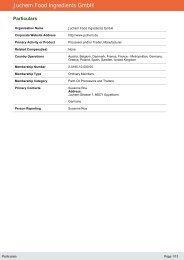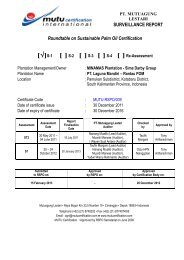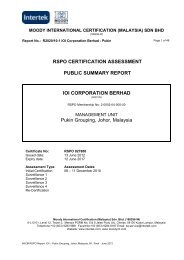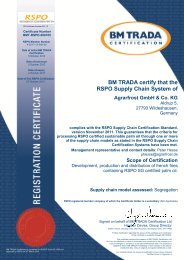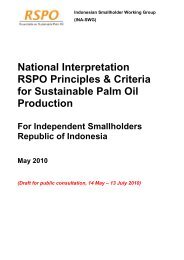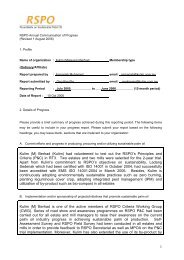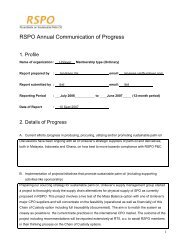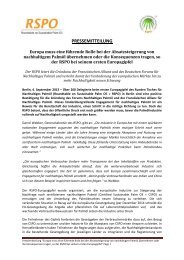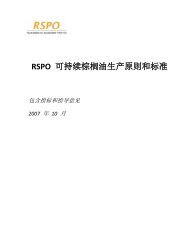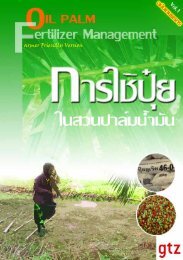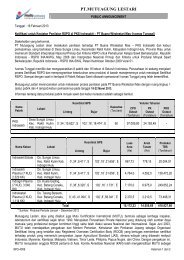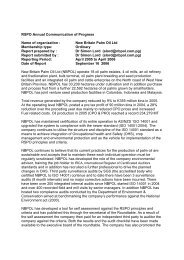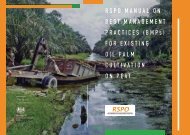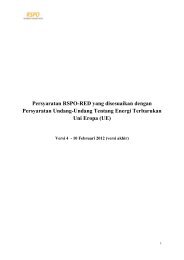RSPO CERTIFICATION ASSESSMENT PUBLIC SUMMARY REPORT
RSPO CERTIFICATION ASSESSMENT PUBLIC SUMMARY REPORT
RSPO CERTIFICATION ASSESSMENT PUBLIC SUMMARY REPORT
You also want an ePaper? Increase the reach of your titles
YUMPU automatically turns print PDFs into web optimized ePapers that Google loves.
PTTN has developed projected annual replanting program until 2017 as seen in this table below:<br />
Unit<br />
Replanting a r e a (Ha)<br />
2011 2012 2013 2014 2015 2016 2017<br />
LPYE 737 289 559 161 730 639 953<br />
PBNE 228 262 304 523<br />
NRME 254<br />
TOTAL 737 543 559 389 992 943 1476<br />
Criterion 4.1<br />
Operating Procedures are appropriately documented and consistently implemented and<br />
monitored<br />
PTTN has Standard Operating Procedures with the best practices for its mill and estates operations.<br />
The mill have been certified to QMS ISO 9001 and HSE management SMK3 by the Ministry of Labour<br />
of Indonesia. Most of the Standard Operation Procedures are incorporated in the SM-K3 management<br />
The following procedures applicable and implemented within sustainable palm oil, such as :<br />
a. SOP for Oil Palm (containing aspects from nursery, land preparation, planting, upkeep,<br />
harvesting, waste management, HCV, emergency preparedness and response, and<br />
environmental monitoring).<br />
b. SOP for Palm Oil Mill (containing stages of process, boiler, power generation, water treatment,<br />
land application, electrical system, quality (inc monitoring of CPO parameters), dispatch and<br />
laboratory).<br />
c. Manual and SOP for Environment Management System, Health & Safety and SPO (containing<br />
application of pesticides, use of PPE , emergency preparadness) .<br />
Operational inspection for harvesting, maintenance, fertilizing, workshops, and other farming<br />
operations by the Vice President of Agronomy (VPA) and Regional Controler (RC) which is performed<br />
every 3 months. However, not all the procedures established are adequate or properly implemented.<br />
It was found that in Standard Operating Procedure for replanting doesn’t explain the timetable to plant<br />
legume cover crops. A Major non-compliance was issued.<br />
There was not clear which operating working instruction (WI) implemented in weeding, spraying and<br />
harvesting process, as there were two IK available: IK-12, IK-20, IK-21 (Rev 00, dated 02.07 2011) or<br />
IKPBNE/01, 02, 04 (Rev.00, dated 01.07 2011). A Major non-compliance was issued.<br />
Compliance Status : Not Compliant (See NCR T-01.07/2011 and T-04.07/2011)<br />
Criterion 4.2<br />
Practices maintain soil fertility at, or where possible improve soil fertility, to a level that<br />
ensures optimal and sustained yield<br />
SMARTRI, a corporate owned Research Institute has laboratory services to provide annual fertilizer<br />
recommendations based on soil sampling and analysis which are carried out once in 3 years while<br />
leaf sampling and analysis are regularly performed on yearly basis. For soil fertility and nutrient<br />
uptake correlation purpose, soil sampling units are arranged to coincide with the leaf sampling units.<br />
Parameters analyzed for soil samples consist of physical analysis ( texture), pH, organic carbon, total<br />
N, P and K, available P and Cation Exchange Capacity. Soil sampling is conducted in accordance<br />
with existing standard operating procedures (Soil Sampling Unit (SSU) Work Instruction)<br />
There are some agronomic practice to improve and maintain soil fertility implemented in PTTN :<br />
1. Using organic fertilizer<br />
2. Plant Legume Cover Crops<br />
3. Pruning and frond stacking<br />
4. Weeding,<br />
Public Summary Report PT. Tapian Nadenggan‐Langga Payung Mill Page 21



